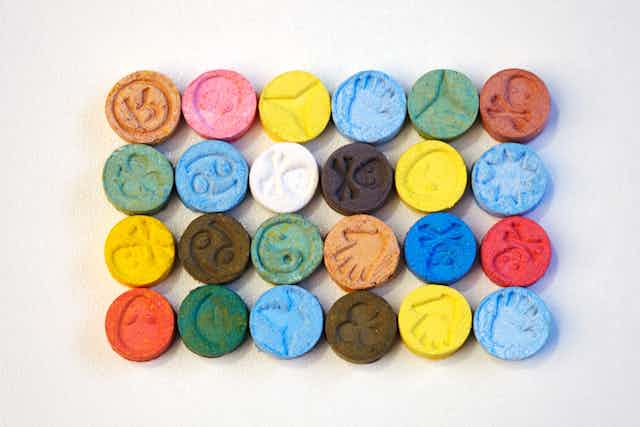MDMA, the active compound in the recreational drug ecstasy, is popularly known to increase one’s love, affection and desire to interact with everyone around. Our latest research suggests that this may not be entirely accurate. Instead, it looks like the effect of MDMA on social interactions may depend on the behaviour of the interacting partner.
In a controlled trial, we gave 20 men MDMA and asked them to play the prisoner’s dilemma while lying in a brain scanner. The prisoner’s dilemma is the classic task used to examine cooperative behaviour.
In the game, each player (there are two players) chooses to compete or cooperate with the other player, and they are assigned points based on the combination of their decisions. The best strategy for players is to cooperate with the other person. But cooperating opens the player up to the possibility of betrayal. If you are playing many rounds with the same person, that person’s behaviour may change how much you wish to cooperate with them.
In our trial, participants were more cooperative after taking MDMA than after taking a placebo, but only if the person they were interacting with was cooperative themselves. If the other person was mostly uncooperative, there was no difference in behaviour on MDMA compared with a placebo. This means that MDMA did not cause people to naively risk betrayal by untrustworthy partners in this task.
Sometimes even trustworthy people can betray you – and this was also true in our research. Occasionally, trustworthy partners would compete rather than cooperate. One reason participants were more cooperative on MDMA could have been due to them not caring about these breaches in trust. But we found this not to be the case.
Our study shows that a trustworthy person competing had a negative effect on participants regardless of whether they had taken MDMA. What was different was that MDMA caused people to more quickly rebuild a cooperative relationship after these breaches in trust.
Brain scans
Since this research was carried out in a brain scanner, it was also possible to see how MDMA changed brain activity when playing the prisoner’s dilemma. The beauty of brain imaging is that you can examine which part of a task might be affected by the drug. We found that MDMA altered brain activity when finding out the partner’s choice, not when deciding how to act.
When receiving feedback of the other players’ choice, key brain areas involved in social processing were more active on MDMA compared with a placebo. This was true regardless of whether the interacting partner was trustworthy or untrustworthy.
Together, these brain areas are important for understanding the intentions of other people, assessing their behaviour and planning future actions based on the feedback of others’ actions.
In the same way that cooperation only increased when playing trustworthy people, there was one part of the brain whose MDMA-induced change in activity depended on the type of person they were interacting with.
Earlier research suggests that this region, the anterior insula, plays a role in integrating appraisal, risk and uncertainty, particularly when processing social rewards. So it seems that MDMA alters how key social brain regions process socially relevant behaviour. But one area, the insula, brings together social information differently depending on the type of person being interacted with.
Why it matters
As interesting as this is, why does it matter? In recent years MDMA has shown potential for use as a medicine, when combined with psychotherapy, for conditions such as post-traumatic stress disorder. This study also tells us how drugs can change our social brain. Considering the profound effect of MDMA on a person’s conscious experience, it is essential to fully understand all of the drug’s effects, not only how it treats core symptoms of specific conditions.
This research also tells us something we did not know before: that different aspects of social interactions can be altered separately. This is important because it suggests potentially fruitful avenues of research when considering problems in social processing in psychiatric conditions, such as schizophrenia.
It may be beneficial to consider which part of cooperative interactions are disrupted in these conditions: the decision-making itself, or processing the feedback of other people’s behaviour. Therapies can then be directed at the part of these interactions that are disrupted.

